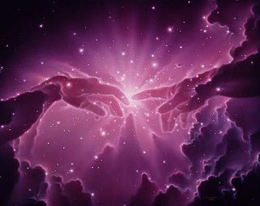 by Vasko Kohlmayer –
by Vasko Kohlmayer –
Many people think that religion is incompatible with science, because they have been told that science refutes God. Nothing could be further from the truth: The more science investigates the world, the more it points to God.
There are many examples of this. Let us here look at what is perhaps the most striking one. Until the 20th century, most scientists believed the universe was eternal and that it had always existed.
But in 1915 Albert Einstein developed his General Theory of Relativity. When its equations were applied to cosmology, their implication were astonishing: The universe was not static, but it began from an ultra-dense dot at some point in the past.
Einstein — himself a believer in an eternally existing universe — initially refused to accept the result. He even went so far as to introduce an imaginary constant into his calculations to avoid the conclusion.
Needless to say, astronomical observations eventually confirmed the soundness of Einstein’s original equations. They showed that the universe is continually expanding in all directions. When this is process is extrapolated backwards, we arrive at an infinitesimal extremity of immense density at a definite point in time past.
The dramatic event at which the universe came into being is today popularly called the Big Bang. Astrophysicists refer to it as the cosmological singularity, and its existence is now broadly accepted throughout the scientific community.
It is important to realize just how remarkable this event was. Prior to the Big Bang there was nothing. There was neither matter nor energy. There even was no time or space. The universe — science tells us — came into existence literally out of nothing.
But the fact that the universe came into being stands as a powerful confirmation of the existence of God.
Why?
everything that begins to exist must have a cause
Because everything that begins to exist must have a cause. And since the universe began to exist, it also must have a cause.
We know that this must be so, because nothing comes into existence without being caused.
If someone told you he saw some object pop into existence, you would conclude he was crazy. And rightly so, since we know by observation and intuition that things just don’t pop into being. Something must bring them forth.
Since the universe came into existence, it, too, must have been brought forth by something. By considering the universe’s characteristics, we can infer some attributes that its cause must possess.
Given all the energy and matter that exist in the cosmos, the cause of it all must be immensely powerful.
Given all the energy and matter that exist in the cosmos, the cause of it all must be immensely powerful.
It must also be immaterial, since no matter existed prior to the Big Bang.
Finally, the cause of the universe must be personal in the sense that it purposefully willed things to come into existence. These are the attributes that are commonly associated with the concept of God.
If we accept the scientific claim that the universe had a beginning, then we are led to the inevitable conclusion that the universe was created by God.
This line of reasoning is called the cosmological argument. Its formal expression goes as follows:
- Everything that begins to exist has a cause.
- The universe began to exist.
- Therefore, the universe must have a cause.
Anyone who takes the time to ponder this syllogism honestly and carefully cannot remain unmoved by its inescapable logic.
Contrary to what people think, science and religion are not incompatible.
Some theists had attempted to use this argument prior to the formulation of the Big Bang theory, but their detractors charged it was invalid by contending that the universe was eternal. Thanks to science we now know they were wrong.
Contrary to what people think, science and religion are not incompatible. Wherever we probe, science points to God. One of the greatest scientific findings of the 20th century — the discovery that the universe had a beginning — stands as a striking illustration of this.
HT: American Thinker



